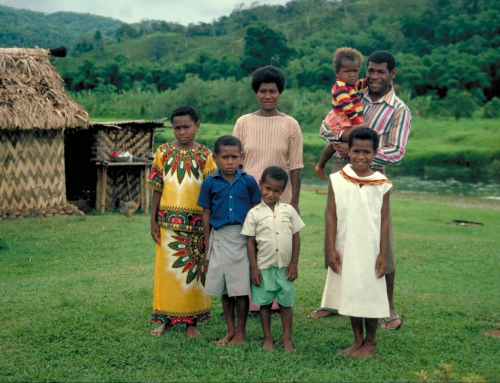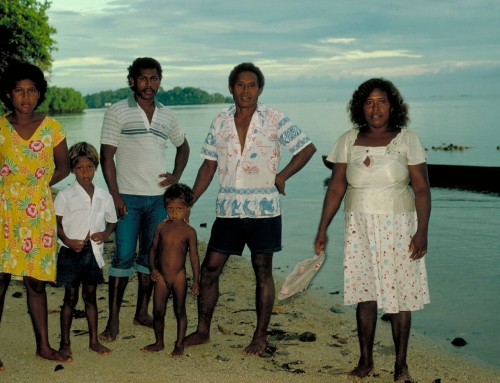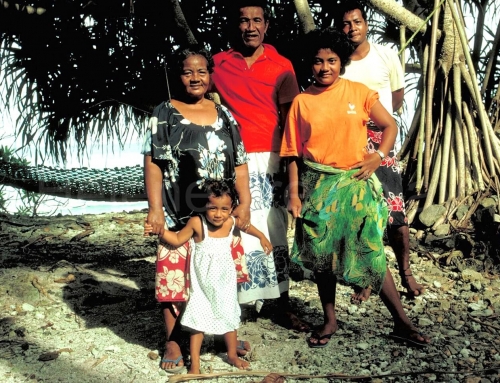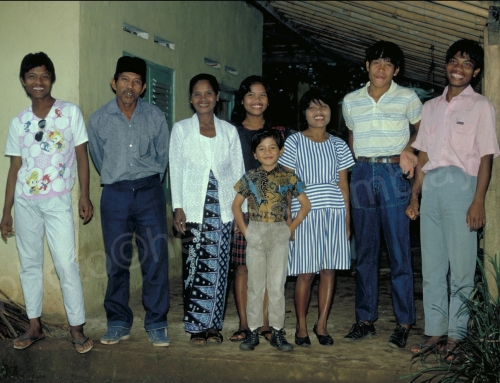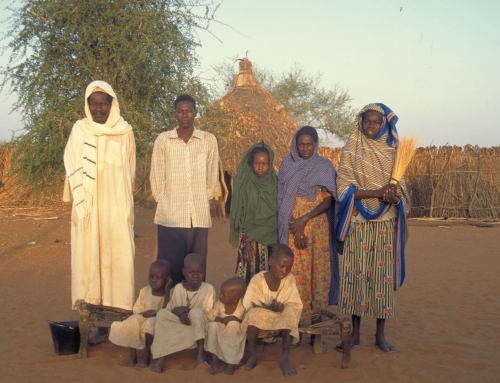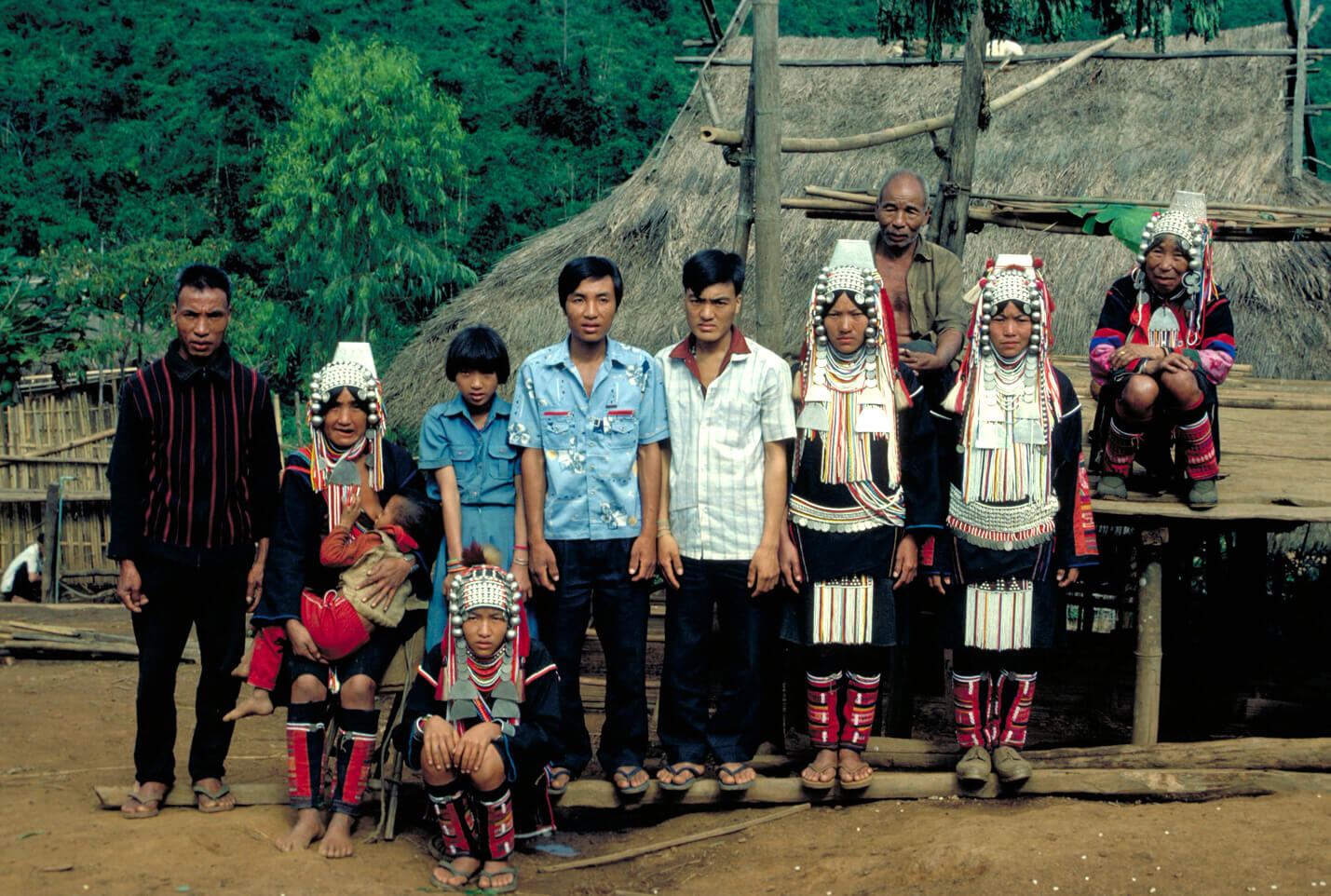
Zago Zellon, aged 74
Apie Zellon, 71
Adjo Zellon, 41
Mechon Zellon, 43
Atse Zellon, 25
Bougnhe (daughter-in-law), 20
Allon, 18
Bunung (daughter-in-law), 23
Mide, 15
Miphaw, 12
Ate, 5
1 horse
2 buffalo
17 pigs and piglets
8 ducks
20 chickens
1 cat
*The Zellons belong to the Akha tribe. Along the borders between South-East Asian countries live whole communities of families with ancient tribal cultures who have been moving back and forth across these borders for many centuries. Governments now seeks to assimilate these families.
Lap Sap Village,
November 21
A baby cries
4:30 Somewhere in the small mountain village of Lap Sap a baby cries, and a mother succeeds in calming him. Bougnhe’s silver headdress jingles as she stirs, but no-one else moves in the Zellons’ bamboo-stilt house.
At the cock’s third crow, 15-year-old Mide gets up to light the kerosene lamps. Now Bougnhe also rises and ties a zdudzan around her waist. Like all the women, she has slept in a skirt, T-shirt and knee-length cotton leggings. All she has to do is put on her woven cotton jacket and hook a wedge-shaped silver plate on her head, which indicates she is a married woman.
As Bougnhe fans a fire of bamboo kindling and hardwood, the white cat, blackened by a crazy tomcat’s night, comes to huddle near the flames. Bunung appears at the women’s door. She has slept with her husband in the nu za, the tiny cane hut reserved for intimate meetings between men and women.
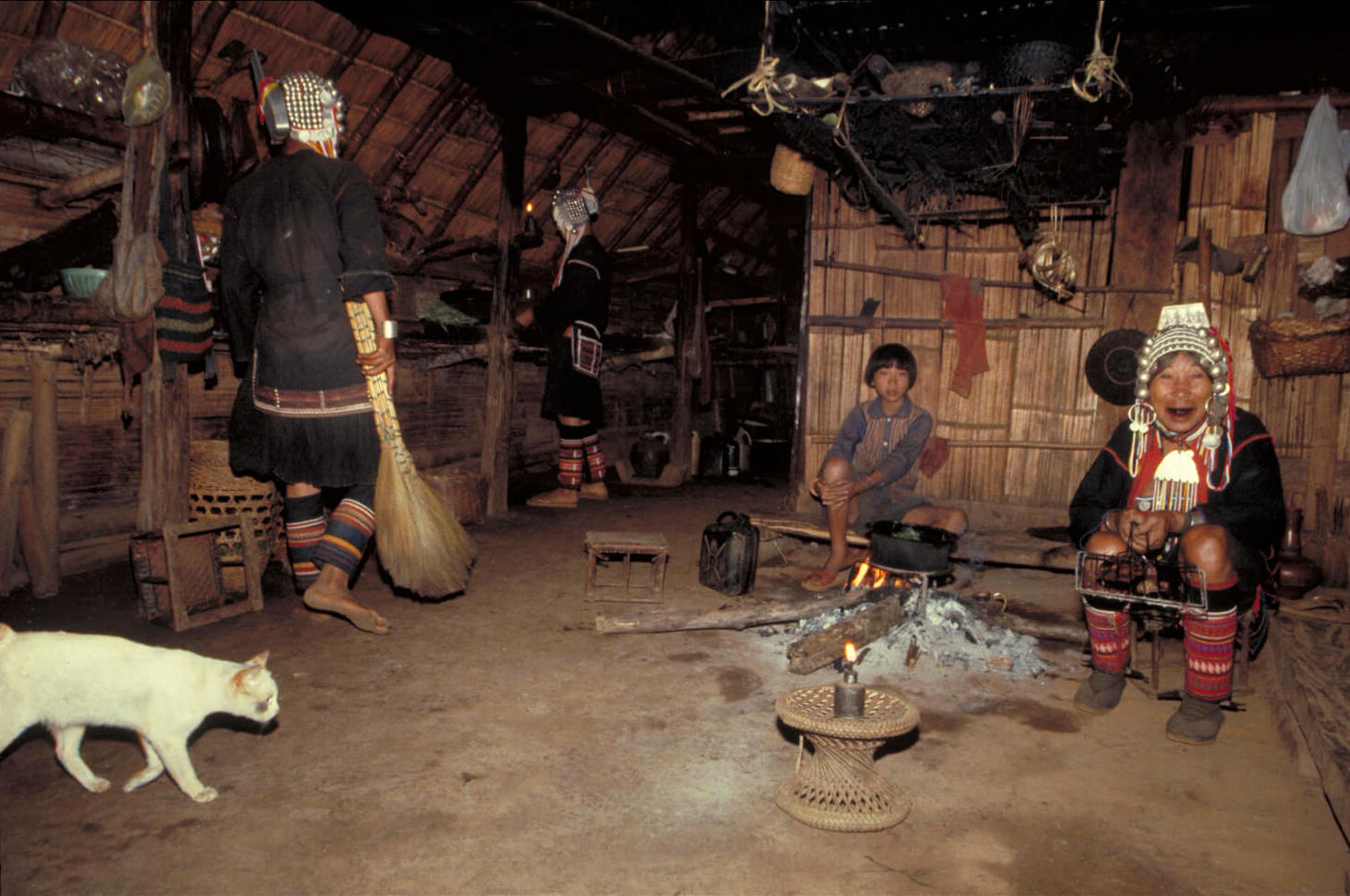
It is customary to rest on Rabbit Day
4:45 From the yard of every house in the village comes the pounding sound of the treadle-driven rice huskers and under their house Bunung and Bougnhe take turns opera ting the heavy treadle. Mide takes the husked grain and sifts it on a woven bamboo tray. The chaff, which is lighter than the rice, separates and falls on the floor; it will be used to fatten the pigs, which bring home much-needed cash. In fact, Adjo will sell some of the pigs today to purchase a new buffalo.
As Atse comes back from his night watch in the family field, his mother, Mechon, puts the rice that has soaked overnight on the woven sieve in the honsambon, a large wooden bowl made from a section of a tree trunk. She put the bowl in an iron pot that sits on the iron tripod of the women’s hearth. It will be two hours before the rice is steamed and breakfast ready. Today is Rabbit Day, the first of the Akhas’ 11 day cycle. It is customary once a month to rest on Rabbit Day, as well as on every Tiger Day, the last day, but the three girls choose instead to go and collect some more of the rice harvest.
It is rice-harvest season
6:30 When they come back with full baskets on their backs and the horse laden with two more daylight has arrived. The breakfast rice is ready.
7:00 As it is rice-harvest season, all the family head out to the field except the grand parents and Adjo, who has gone to buy his buffalo. Atse, the eldest son harnesses the horse as the women harness baskets on each other’s back. The baskets are mounted on a pole across the shoulders and secured with a band across the forehead
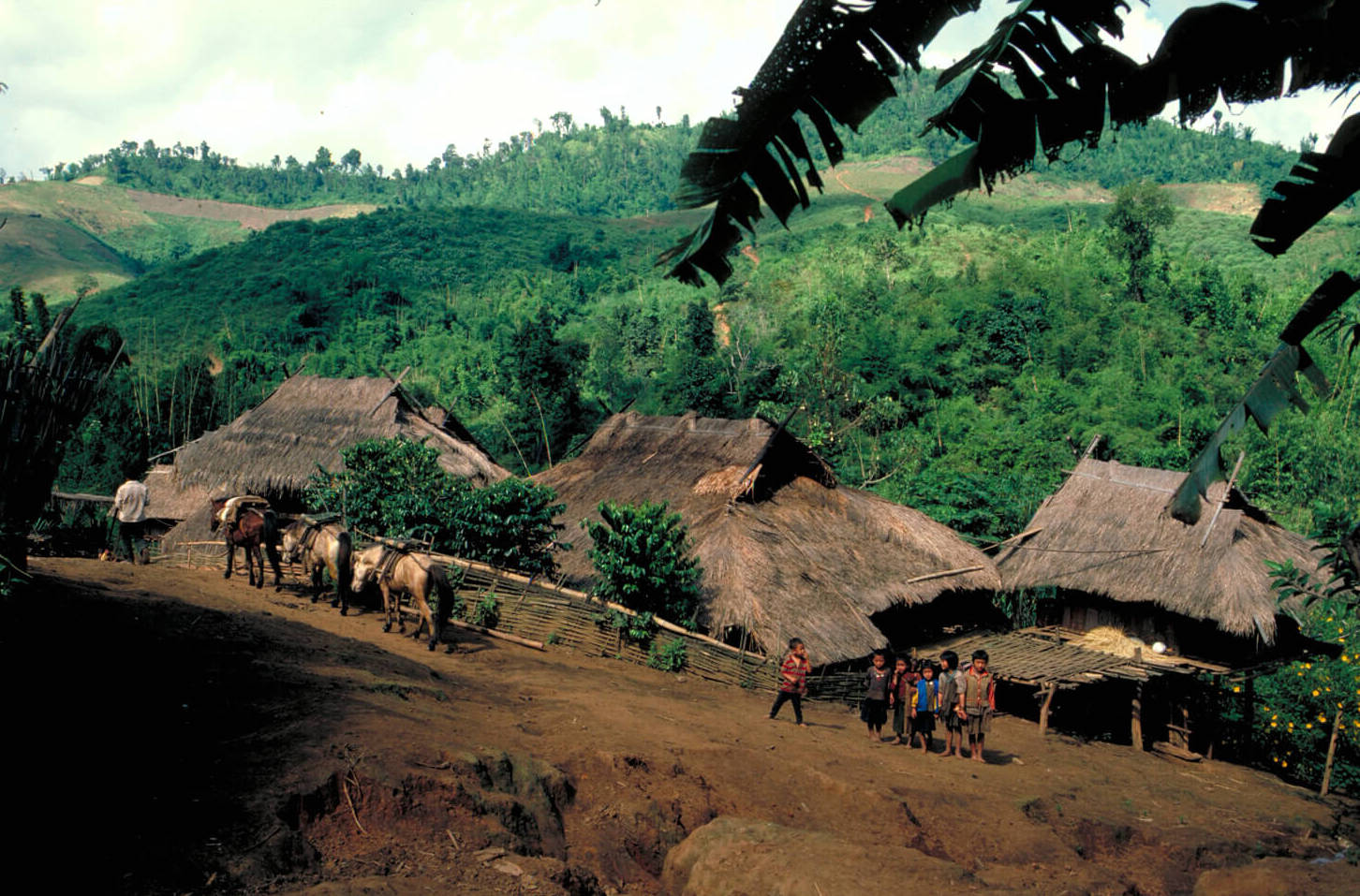
Theirs has been a long, continuous journey
They head down the mountain, following the zigzagging trails. Mountain life has made their short legs strong and after half an hour they reach their field hut, where the harvested rice is stored to bring home. An estimated 23,000 Akhas now live in Thailand. According to the oral history passed down by generations in songs and poems, theirs has been a long, continuous journey from their ancestral homeland in Central Asia. The Zellon family lived on the Burmese border, but their village was becoming too crowded with refugees like themselves and land was too scarce. Seven years ago, with 14 other families, the Zellons followed a zdoma, their headman, walked for three days and found a place on a mountain slope similar to what they had left. They settled down, cleared fields and built their traditional houses. This might be the end of the Akhas’ long historical journey, for these Thai mountains are on the edge of the large central plain, which Akhas would hesitate to inhabit.
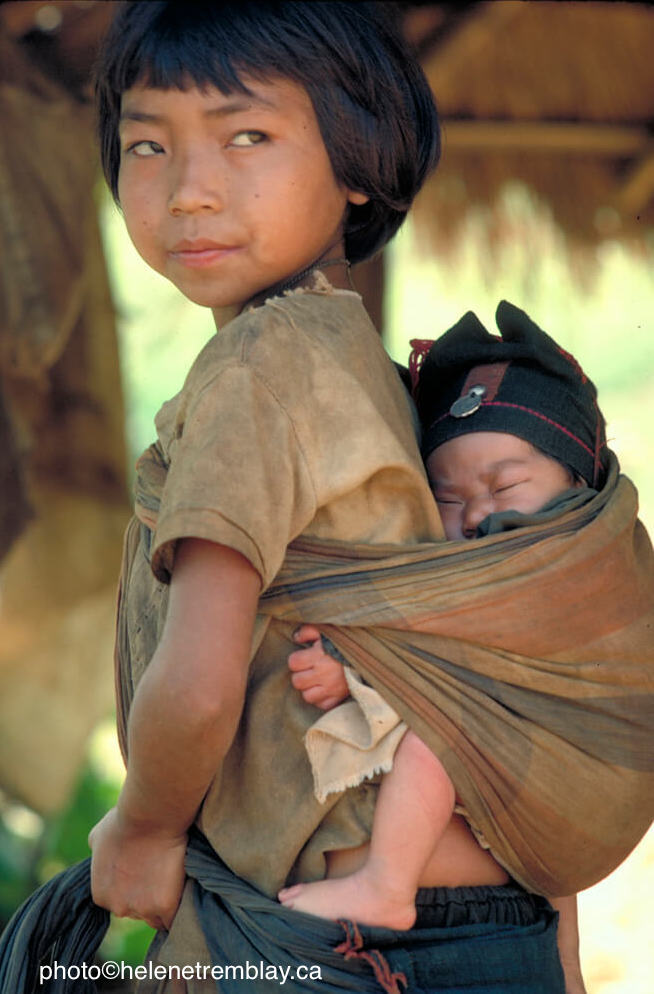
The pounding echoing off the mountain
8:00 The Zellons put down their baskets and eat a few papayas. The women take off any jewelry that will interfere with work, put on black pants under their black miniskirts and a hood over their silver headdresses, pick up their long, crooked wooden sticks and go off to thresh. In the field, the rice has been stacked. Bougnhe helps Bunung lay a large plastic sheet on the ground. Then she climbs up on a stack and rolls the rice shafts up in little bunches. She hands these to Bunung, who lays them down in a row. When they have a number lined up, they beat the stalks so the rice detaches itself and falls on the plastic. Mechon has gone to the fields where the family grows vegetables and tobacco. She cuts greens and comes back to the hut to start a fire and prepare lunch for the workers. Ate follows his mother around. At five, he still breast-feeds. Mechon’s milk has long dried up. “But he is my last,” she says, looking indulgently at her spoiled boy.
Only the noise of the pounding echoing off the mountains breaks the rural silence. People are hurrying to bring the rice to shelter. In a few months, the Zellons will be planting corn. Ideally, the land should rest, as has been the tradition. But there are too many people in the mountains now and deforestation is controlled. New land cannot be cleared, and they must continually plant the already-cleared land in order to grow sufficient crops.
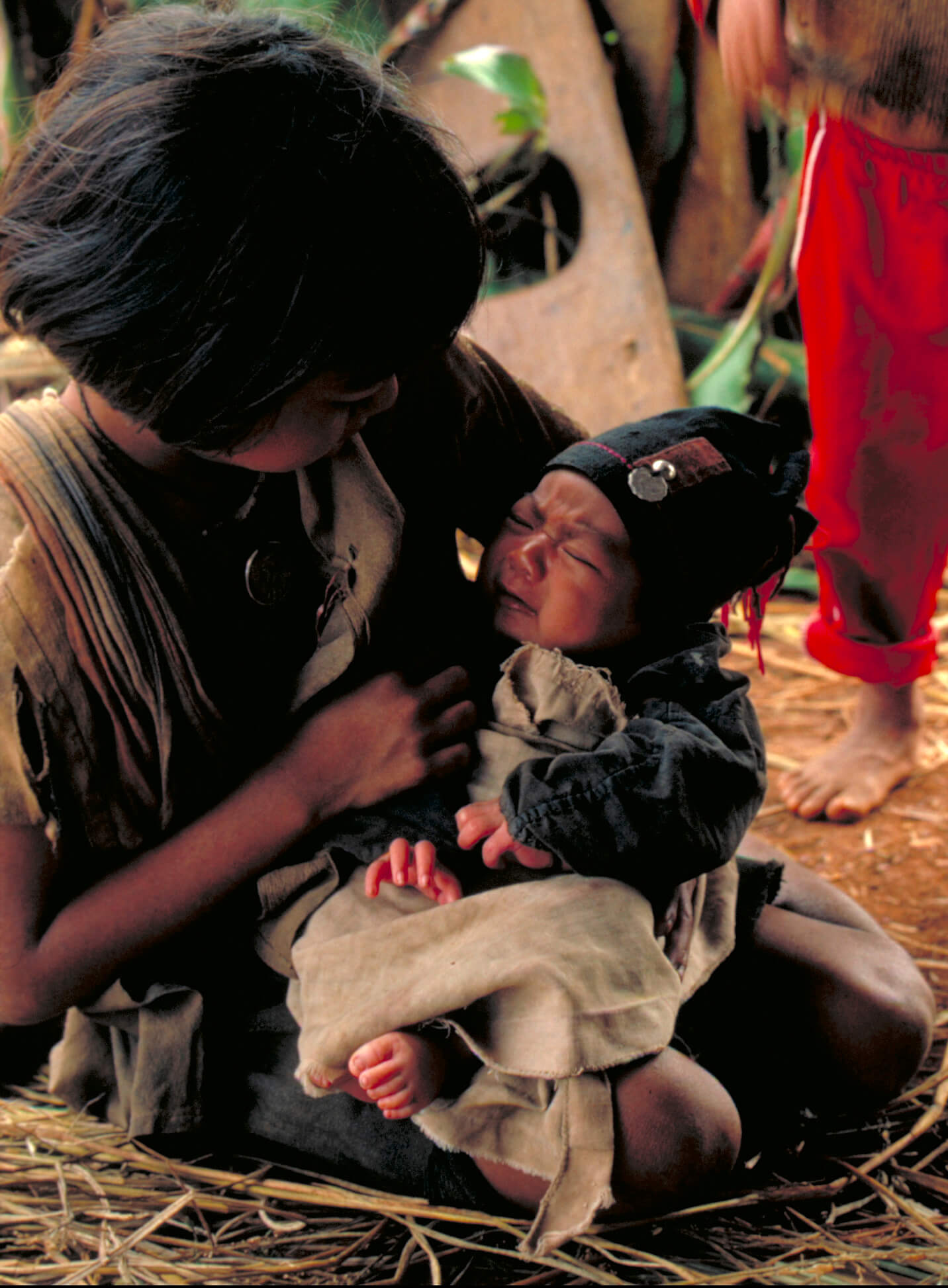
Enlivened by rice whiskey
9:00 Grandfather Zago has his morning free, so he joins other elders to watch a neighbour slaughter his pig. The men’s talk will be enlivened by rice whiskey. He can drink in peace. Adjo has agreed that the family will live together as long as the old man is still alive. Since their wealth is based on the number of their workforce and their diligence, this makes sense anyway. Grandmother Apie crosses the house at a slow, steady pace and brings corn to the poultry in the back yard. She makes three trips, then sits on the open veranda to string the green vegetables on a bamboo thread and hang them to dry in the sun. Later this salad will be marinated in water, spices and salt.
11:00 Grandmother stokes the fire, boils some greens and eats them with a handful of rice. As Grand pa Zago places a piece of meat beside her, a chicken runs up and snatches it. Grandma yells as Grandpa runs after the bird, rescues the meat, cleans it, and brings it back to his wife. Meat is too precious to waste.
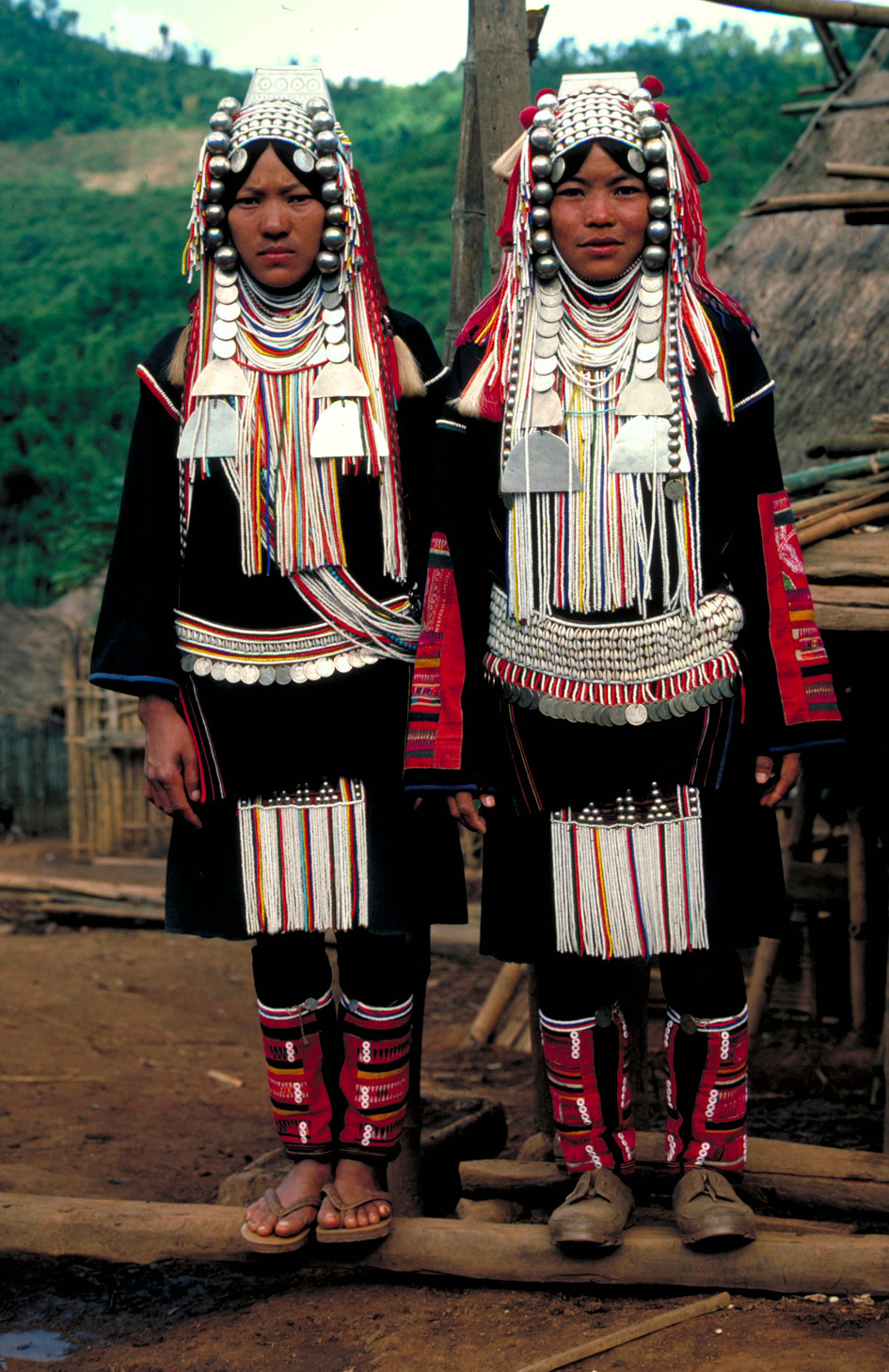
The Golden Triangle
12:40 Grandpa returns to sit with the elders. The sun is out from under the clouds, so the tomcat sleeps in the sun. Grandma takes off her sweater to mend it, letting her old dry breasts flop on her stomach
1:00 The men return from the fields to attend a meeting at the community centre run by the Hill Tribe Welfare Division. It is a way for the government to keep track of the number of refugees entering the country, to integrate those that come and to teach the peasants to grow other cash crops besides poppies, from which opium is extracted and heroin made. The pretty red flower has made this area, known as the Golden Triangle, famous for violence and bloodshed brought on by the lucrative crop.
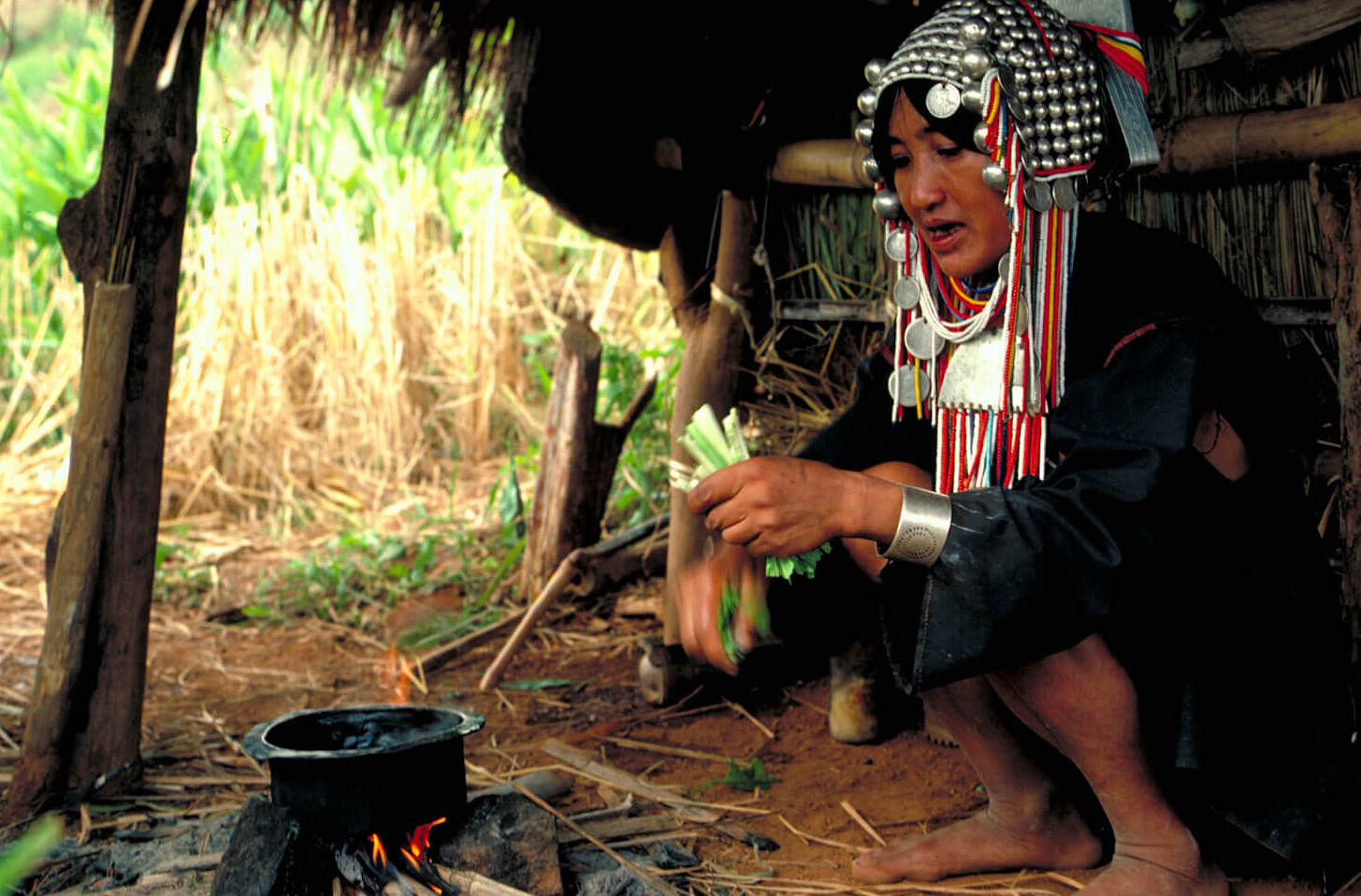
The pigs and chickens know his voice
4:15 Everyone is home. Atse is washing his clothes at the public standpipe; like all Akha men, he is responsible for his personal belongings. In front of the house, Adjo excitedly discusses his day’s purchase with a group of men. For just a little more money, he bought a male and a pregnant female buffalo. Like a man who has just bought his first used car, Adjo looks for his friends’ approval. He has borrowed money that he must pay back in 17 days, if he does not want to pay interest, and hopes the finished harvest will bring that amount.
Grandpa puts a bowl of corn on the veranda and lets out a low squeal. The pigs and chickens know his voice and swarm over the feeding trough as he referees. The girls have carried a last basket of rice from the fields and take turns at the water tap, filling the water gourds and bathing and getting the dust out of their clothing, as the sun prepares to set over the mountains.
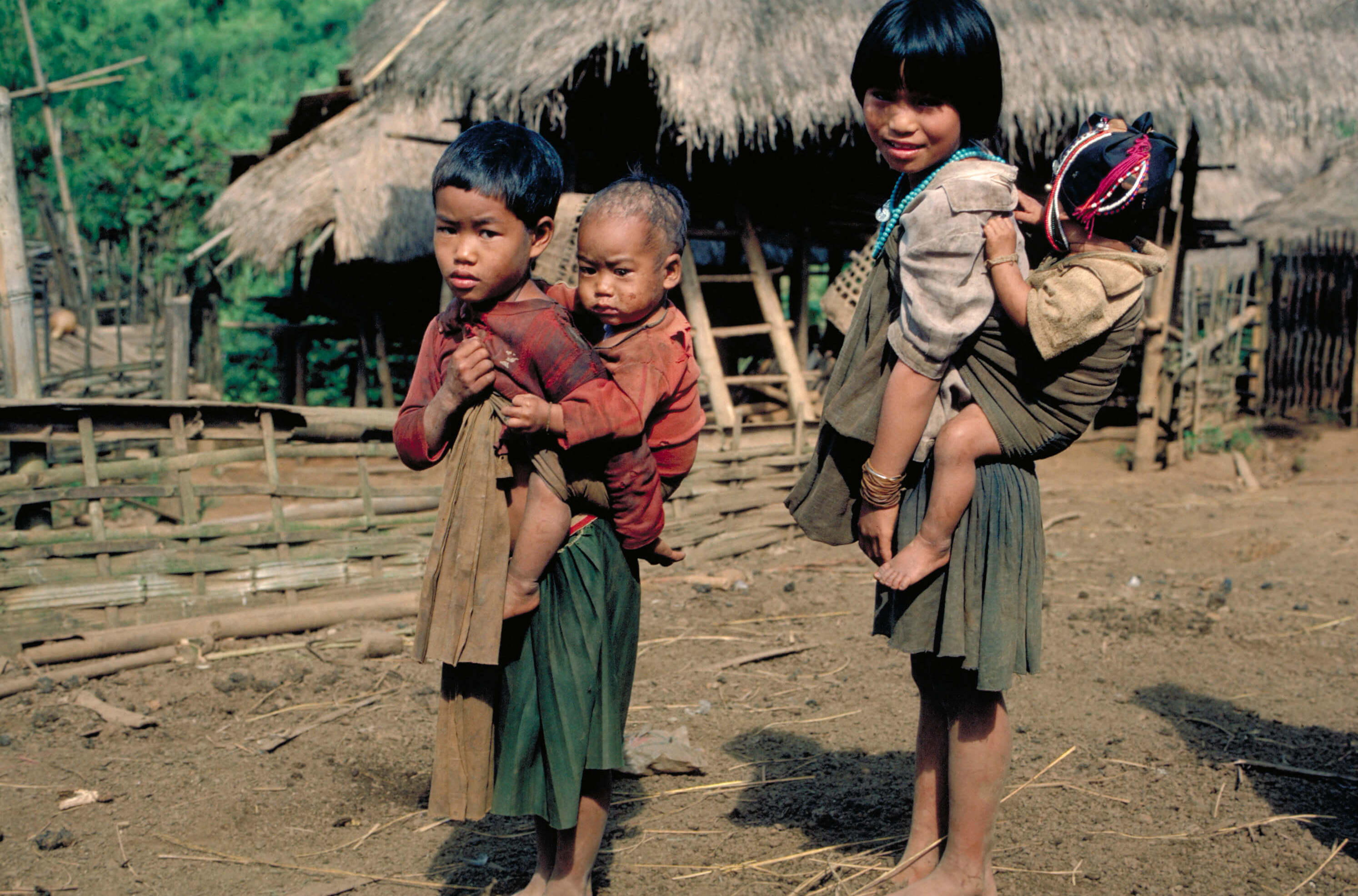
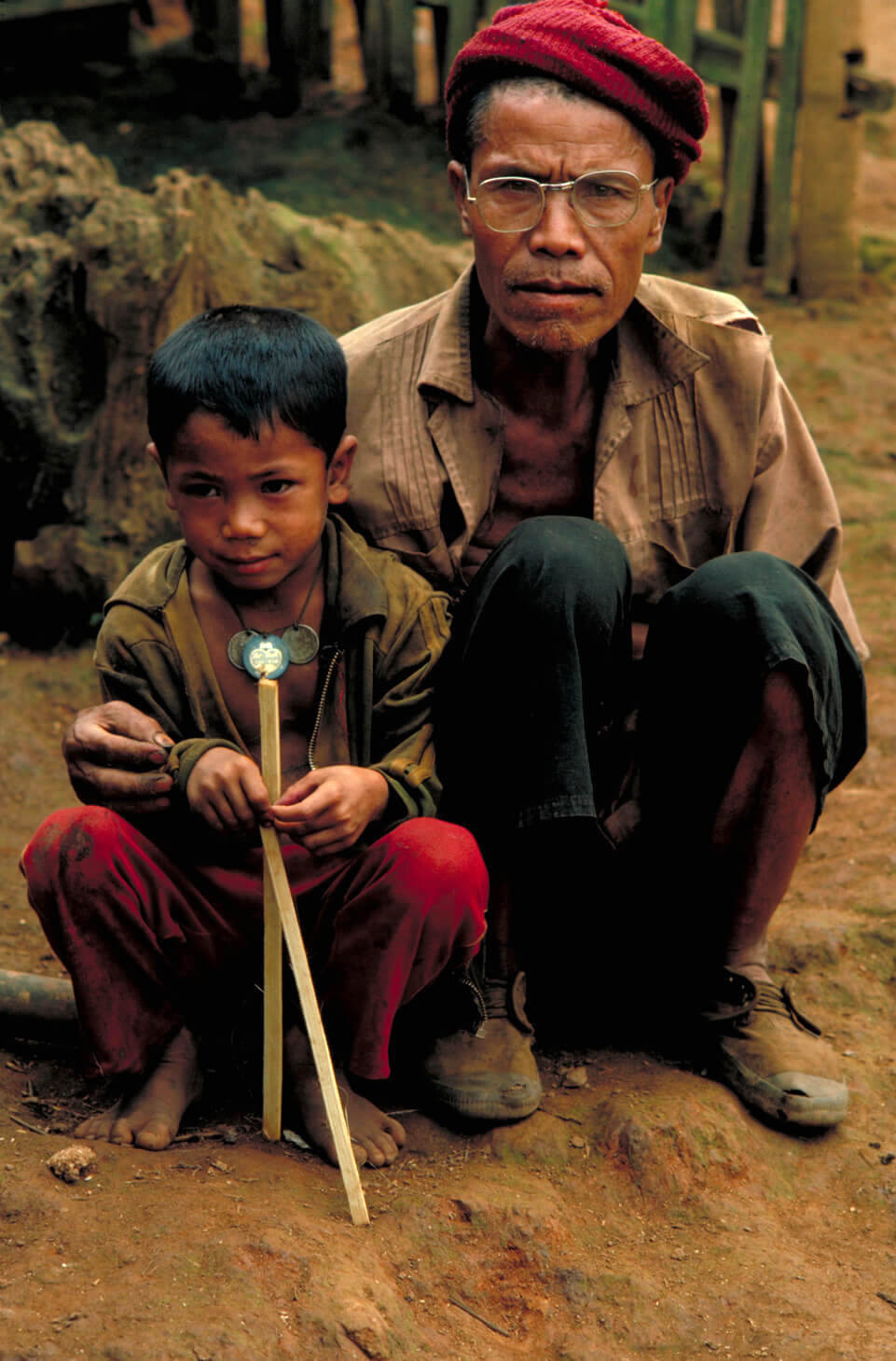
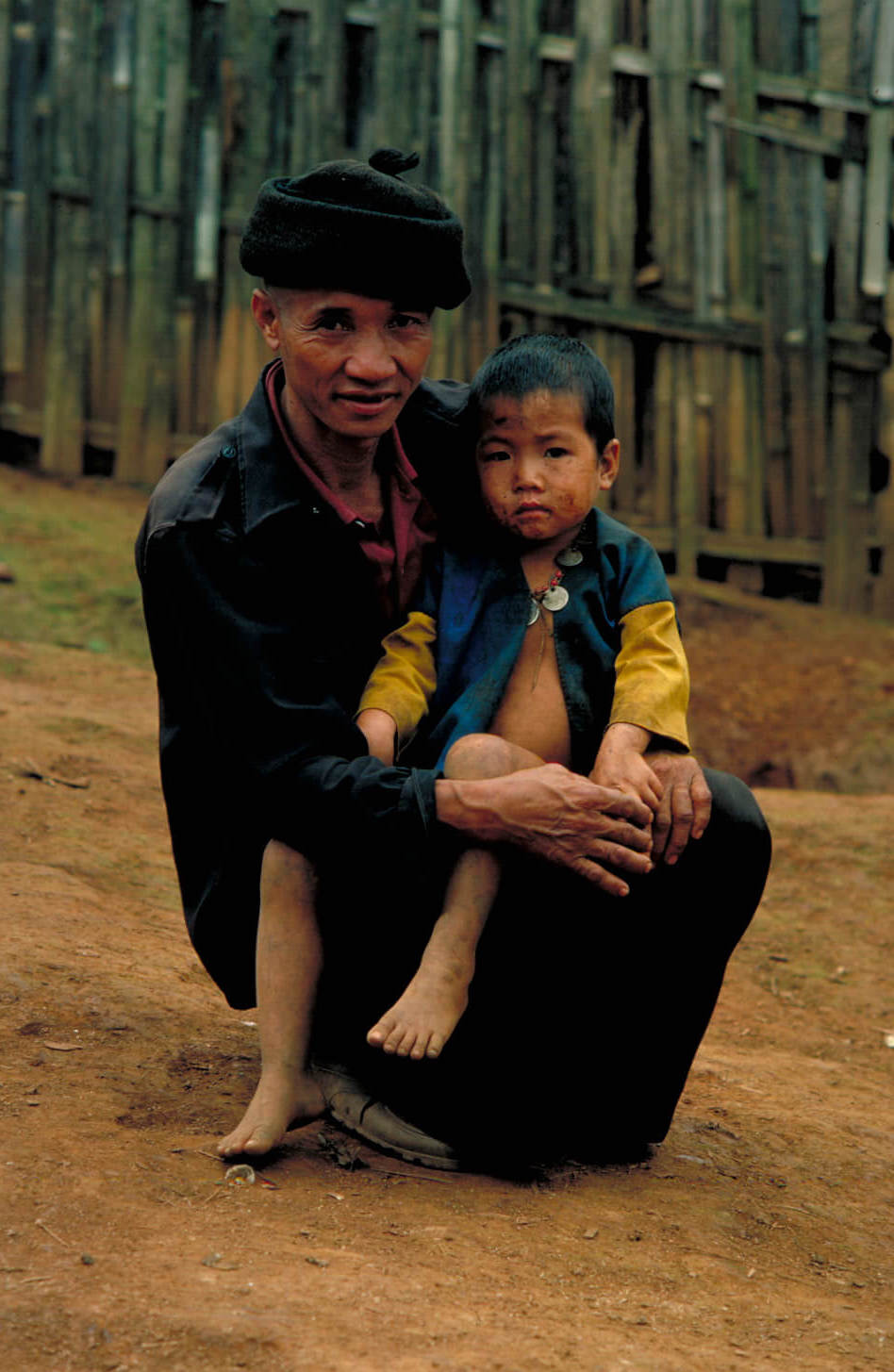
Massaging her grandmother’s old body
5:30 Allon has washed and changed and settles his gun over his shoulder. It is his turn to sleep in the field hut and protect the harvest from animals and thieves. Darkness settles over the house. Grand pa, Ad jo, Atse and a villager are having dinner on the men’ s side and are talking buffalo. On the women’s side, always more gossipy and lively, the talk is of the day’s work, clothing, marriages, embroidery and the New Year festivities in mid-December. Their dinner finished, the women take off their sweaty, smelly head-dresses to scratch their heads with a needle and comb their long black hair. Every three days they wash and polish the silver coins that adorn them. The amount of silver on their body expresses their wealth.
8:30 Mide lays clown the bark sleeping mats and massages her grandmother’s old body with all her strength so it will relax and allow her to rest better for the night. And as the other women prepare for bed, Bougnhe lights a torch of grass to make her way to the little house where she will meet Atse.
The Zellons have six little huts, three for the couples (Adjo and Mechon, Atse and Bougnhe and Allan and Bunung) and three for rice and corn storage. In the big house, there are separate sleeping and living areas for men and women, as well as separate hearths.
Every evening, Grandma’s betel-nut-stained smile greets the family coming back from the fields. This is the women’s side of the dwelling. On the other side of the wall, the men have their cooking hearth and sleeping place.

Home in Thailand


